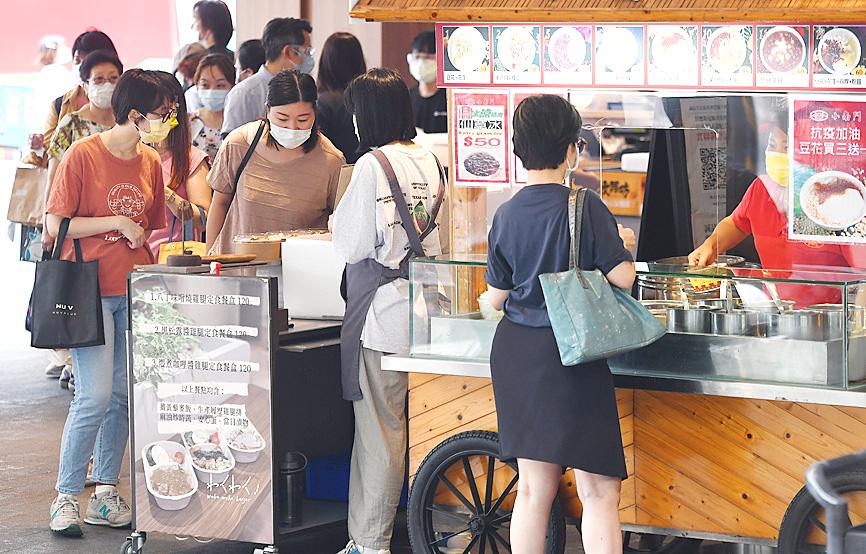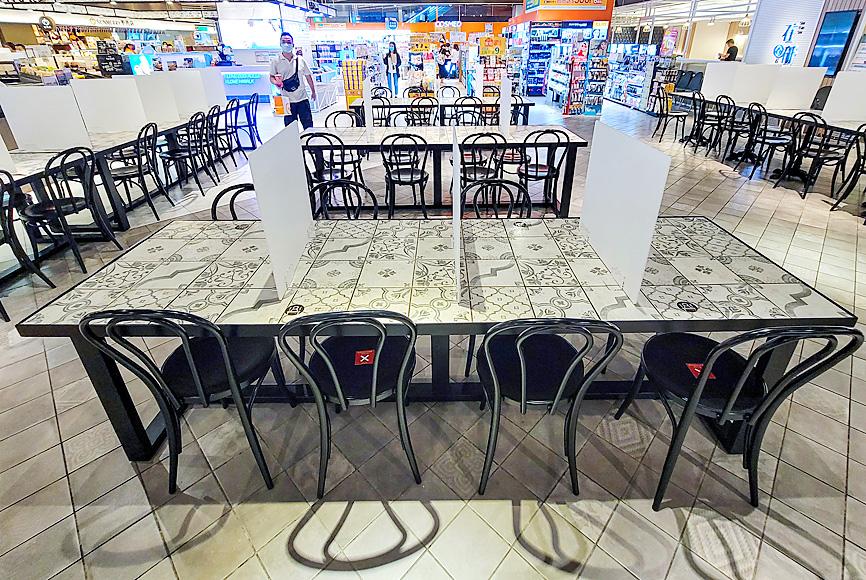Tainan is the only city that will conditionally allow dining at restaurants, while other local governments yesterday said that dine-in restrictions would remain in place, despite a relaxation of a nationwide ban announced by the Central Epidemic Command Center (CECC) on Thursday.
Taoyuan, Kaohsiung, Taichung, Keelung, Hsinchu City, and Yilan, Hsinchu and Miaoli counties are not to repeal dine-in bans.
Starting on Tuesday, some measures imposed through a nationwide level 3 COVID-19 alert would be eased, including dine-in restrictions at restaurants, the CECC said, as it extended the alert until at least July 26.

Photo: Liao Chen-huei, Taipei Times
However, local governments would be allowed to keep measures in place if needed, the center added.
The Taipei City Government yesterday said it would continue to allow only takeouts at restaurants as long as the city is under the level 3 alert.
Taipei Mayor Ko Wen-je (柯文哲) said that all regulation rollbacks must be accompanied by tangible measures and policies.

Photo: CNA
The city’s disease prevention measures also aim to protect the economy and society, Ko said, adding that lifting the ban on dining at restaurants and mask mandates are at the bottom of his priority list.
School and campus exercising grounds, Taipei Zoo, the Taipei Children’s Amusement Park and the Taipei Astronomical Museum would remain closed, he said.
Public libraries, while remaining closed, would adopt measures to allow people to borrow and return books, for example through cooperation with convenience stores that can serve as drop-off locations for borrowed books, he said.
Movie theaters would be allowed to operate at reduced capacity and implement social distancing, he said, adding that moviegoers would have to wear masks at all times, and eating or drinking would not be allowed.
Kindergartens are allowed to resume operations only if all employees have been vaccinated, he said, adding that daycare facilities for people with special needs would operate at reduced capacity.
Separately, New Taipei City Mayor Hou You-yi (侯友宜) yesterday said that the city would also keep its dine-in ban in place, citing a prevalent high risk of infection in the city, as well as a lack of nationwide standards and insufficient COVID-19 vaccine coverage.
The Tainan City Government said that it would from Tuesday allow dining at restaurants, making Tainan the only one among the six special municipalities to lift the ban.
Additional reporting by Wang Jung-hsiang and Chou Min-hung

DEMOGRAPHICS: Robotics is the most promising answer to looming labor woes, the long-term care system and national contingency response, an official said Taiwan is to launch a five-year plan to boost the robotics industry in a bid to address labor shortages stemming from a declining and aging population, the Executive Yuan said yesterday. The government approved the initiative, dubbed the Smart Robotics Industry Promotion Plan, via executive order, senior officials told a post-Cabinet meeting news conference in Taipei. Taiwan’s population decline would strain the economy and the nation’s ability to care for vulnerable and elderly people, said Peter Hong (洪樂文), who heads the National Science and Technology Council’s (NSTC) Department of Engineering and Technologies. Projections show that the proportion of Taiwanese 65 or older would

Nvidia Corp yesterday unveiled its new high-speed interconnect technology, NVLink Fusion, with Taiwanese application-specific IC (ASIC) designers Alchip Technologies Ltd (世芯) and MediaTek Inc (聯發科) among the first to adopt the technology to help build semi-custom artificial intelligence (AI) infrastructure for hyperscalers. Nvidia has opened its technology to outside users, as hyperscalers and cloud service providers are building their own cost-effective AI chips, or accelerators, used in AI servers by leveraging ASIC firms’ designing capabilities to reduce their dependence on Nvidia. Previously, NVLink technology was only available for Nvidia’s own AI platform. “NVLink Fusion opens Nvidia’s AI platform and rich ecosystem for

Taiwan Semiconductor Manufacturing Co (TSMC, 台積電) yesterday said it is building nine new advanced wafer manufacturing and packaging factories this year, accelerating its expansion amid strong demand for high-performance computing (HPC) and artificial intelligence (AI) applications. The chipmaker built on average five factories per year from 2021 to last year and three from 2017 to 2020, TSMC vice president of advanced technology and mask engineering T.S. Chang (張宗生) said at the company’s annual technology symposium in Hsinchu City. “We are quickening our pace even faster in 2025. We plan to build nine new factories, including eight wafer fabrication plants and one advanced

‘WORLD’S LOSS’: Taiwan’s exclusion robs the world of the benefits it could get from one of the foremost practitioners of disease prevention and public health, Minister Chiu said Taiwan should be allowed to join the World Health Assembly (WHA) as an irreplaceable contributor to global health and disease prevention efforts, Minister of Foreign Affairs Lin Chia-lung (林佳龍) said yesterday. He made the comment at a news conference in Taipei, hours before a Taiwanese delegation was to depart for Geneva, Switzerland, seeking to meet with foreign representatives for a bilateral meeting on the sidelines of the WHA, the WHO’s annual decisionmaking meeting, which would be held from Monday next week to May 27. As of yesterday, Taiwan had yet to receive an invitation. Taiwan has much to offer to the international community’s